Specializing in the Sale of Medical & Healthcare Related Businesses
Determining the Right Asking Price
How to Set the Right Price for Your Business
5 min read


How to Determine the Right Asking Price for Your Healthcare Business
Setting the right asking price for your healthcare business is one of the most critical steps in the selling process. Price it too high, and you risk scaring away potential buyers. Price it too low, and you could leave a significant amount of money on the table. Striking the perfect balance requires a deep understanding of your business’s financial health, market conditions, and buyer expectations.
Unlike traditional businesses, healthcare companies - whether they are medical practices, dental offices, pharmacies, assisted living facilities, or physical therapy clinics - come with unique valuation challenges. The value of a healthcare business isn’t just about revenue and profit margins; it also depends on patient loyalty, referral relationships, compliance records, and operational efficiency.
If you’re preparing to sell your healthcare business, knowing how to determine the right asking price can make a significant difference in attracting serious buyers and securing a successful sale.
Understanding Business Valuation Methods
There is no single formula for pricing a healthcare business, but several standard valuation methods can help establish a fair asking price. One of the most common approaches is the earnings-based valuation, which looks at the business’s profitability. Buyers often focus on a metric called EBITDA (Earnings Before Interest, Taxes, Depreciation, and Amortization) to gauge how much cash flow the business generates before certain expenses.
A multiple is then applied to EBITDA to determine the value. The exact multiple depends on various factors, including industry trends, risk level, and business size. For example, a well-established medical practice with a strong patient base and minimal risk may command a higher multiple than a newer, less stable operation.
Another valuation method is the revenue-based approach, where the price is calculated as a percentage of annual gross revenue. This method is often used for certain healthcare businesses, such as dental practices or physical therapy clinics, where revenue consistency plays a key role in value. However, revenue alone doesn’t tell the whole story, profitability and operational efficiency must also be considered.
The asset-based approach focuses on tangible and intangible assets, including medical equipment, office space, technology, and intellectual property. While healthcare businesses typically hold valuable physical assets, intangible elements like patient relationships, brand reputation, and contracts with insurers or referral sources can significantly impact the final price.
Factors That Influence Your Asking Price
Beyond the valuation formulas, several key factors will impact how much your healthcare business is worth in the eyes of buyers.
Profitability and Cash Flow: Buyers want to see a track record of stable and growing profits. A business with strong financials and positive cash flow is more attractive than one with inconsistent earnings or high overhead costs. If your business has high revenue but low profitability, it may not command the price you expect.
Patient Base and Referral Sources: The stability of your patient base plays a major role in valuation. A business with a loyal, diverse group of patients is more appealing than one dependent on a few high-value clients. If your referrals come from a single source, such as a hospital contract or a specific insurance provider, buyers may perceive a higher risk if that relationship changes.
Owner Dependency: A business that heavily relies on the current owner’s personal relationships, expertise, or presence can be harder to sell. Buyers prefer businesses with strong management teams and systems that allow for a smooth transition. If you are the primary provider, developing a plan to gradually transition patient care to other staff members can increase the business’s value.
Market Conditions and Industry Trends: Healthcare is an evolving industry, and market conditions can affect valuation. A practice in a high-demand area with growing patient needs will be worth more than one in a declining or oversaturated market. If your business is in a specialty field that is seeing increased demand, such as home healthcare or telemedicine, this can enhance its value.
Regulatory and Compliance Standing: Buyers will closely examine whether your business is in full compliance with healthcare regulations, licensing requirements, and data protection laws. If there are outstanding legal or compliance issues, they can reduce your business’s value or deter buyers altogether. Ensuring all compliance documents and operational licenses are up to date can help maintain your asking price.
Avoiding Common Pricing Mistakes
One of the biggest mistakes sellers make is pricing their business based on personal expectations rather than market realities. Emotional attachment can lead to overvaluation, especially if you’ve spent years building your business. While it’s natural to place a high value on your work, buyers will base their offers on objective financial data and industry comparisons.
On the other hand, some business owners set their price too low out of urgency or lack of knowledge. Selling at a lower price may result in a faster deal, but it can also mean missing out on substantial financial returns. Taking the time to properly assess your business’s worth ensures you don’t leave money on the table.
Another common mistake is ignoring deal structure. The total sale price is important but so is how the deal is structured. Some buyers may offer a lower upfront payment with additional payments based on future performance. Understanding different deal structures can help you negotiate terms that align with your financial goals.
Preparing for a Valuation and Sale
If you’re considering selling your healthcare business, preparing well in advance can help maximize its value. Start by ensuring your financial records are clean, accurate, and up to date. Buyers will want to review profit and loss statements, tax returns, payroll records, and accounts receivable reports. Having organized documentation demonstrates transparency and builds buyer confidence.
Operational improvements can also make a difference. If there are inefficiencies in billing, scheduling, or patient management, addressing them before listing your business can enhance its appeal. Streamlining operations, implementing automation, and ensuring compliance with regulations can make your business more attractive and justify a higher asking price.
Engaging a professional business broker with experience in the healthcare sector can be invaluable. A broker can conduct a thorough valuation, market your business to the right buyers, and negotiate favorable terms on your behalf. They can also help maintain confidentiality, ensuring that staff, patients, and competitors do not find out about the sale prematurely.
Final Thoughts: Setting the Right Price for Success
Determining the right asking price for your healthcare business requires a combination of financial analysis, industry insight, and strategic planning. By using proven valuation methods, considering key business factors, and avoiding common pricing mistakes, you can attract serious buyers and secure the best possible deal.
If you’re thinking about selling your healthcare business and need expert guidance on valuation and pricing, we can help. With our experience in brokering successful medical business sales, we can provide a customized strategy to ensure you get the best price and terms.
Contact us today for a confidential consultation and take the first step towards a successful and profitable sale.
MedPro Business Advisors at Boss Group International
Specializing in the sale of medical and healthcare related businesses
© 2025. All rights reserved.
